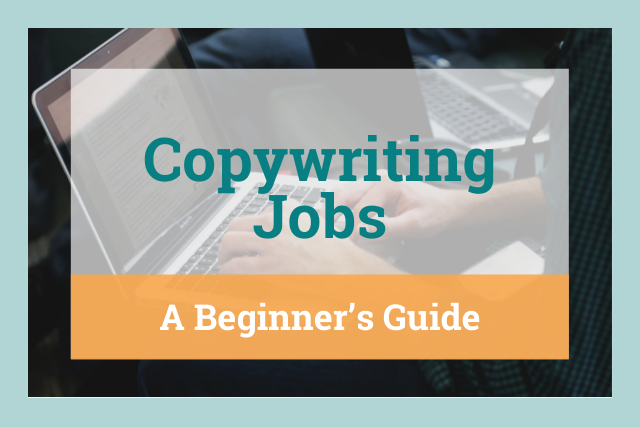
Is copywriting a good career for you? What is copywriting and how do you get started?
In this guide, we’re breaking down everything beginners need to know about a career in copywriting.
We’ll cover what copywriting is and isn’t. Then we’ll discuss all the different types of copywriting jobs.
We’ve provided the top five skills you need to know to be a successful copywriter.
Finally, take a look at our top ten tips for getting copywriting jobs as a beginner. By the end of this guide, you’ll know if copywriting is your dream career.
What Is Copywriting (as a Job)?
There are many different types of writing jobs out there. Copywriting is a specific type of writing with the goal of selling something.
Copywriting isn’t limited to ads and product descriptions, though. Sales is the ultimate goal of copy, but the copy you write might focus on getting email sign-ups or scheduling a consultation.
You can think of copywriting as conversion writing. A copywriter wants to convert the reader, or have them take some sort of action, from purchasing something to clicking a link for more information.

While all copy has the goal of converting their audience, conversion copywriting plays a long game. This might involve building brand recognition, offering free content, and gaining followers. Direct response copywriting is about converting the audience right here, right now. It encourages them to take an action, usually purchasing something, right at that moment.
Copywriting is a spectrum, with conversion on one end and direct response on the other.
Many types of copy are both: the direct response might be to follow or subscribe, but this is just an early stage of the sales funnel, or the process of taking your audience from awareness to buying.
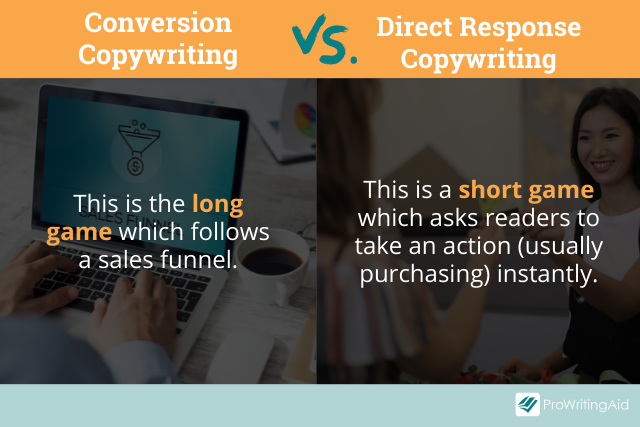
What’s the Difference Between Marketing and Copywriting?
If copywriting is about selling, you might be curious how it differs from marketing. The two are related, and at many companies copywriters fall under the marketing department.
You can think of marketing as a big umbrella that includes what to sell and how to sell it.
Copywriting is how to use words to achieve those marketing goals. A marketing copywriter will often specialize in advertisements and product descriptions, as opposed to landing pages or blogs.
We’ll cover more about different types of copy in a later section.
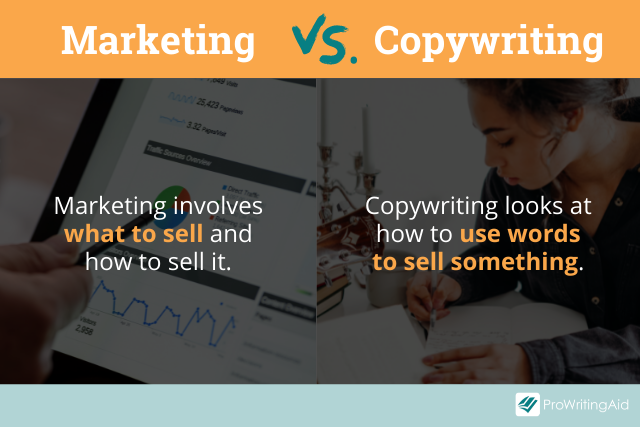
Can You Make Money as a Freelance Copywriter?
Copywriting can be a lucrative career for an experienced writer. In fact, some top copywriters make over six figures a year! It takes plenty of experience to get to that level.
Entry-level copywriting jobs typically pay in the $35,000 to $45,000 range, according to PayScale. The more experience you gain, the more money you’ll make.
Keep in mind that you will often make more money as a freelance copywriter, although building a portfolio and client base to earn you top-dollar can take years.
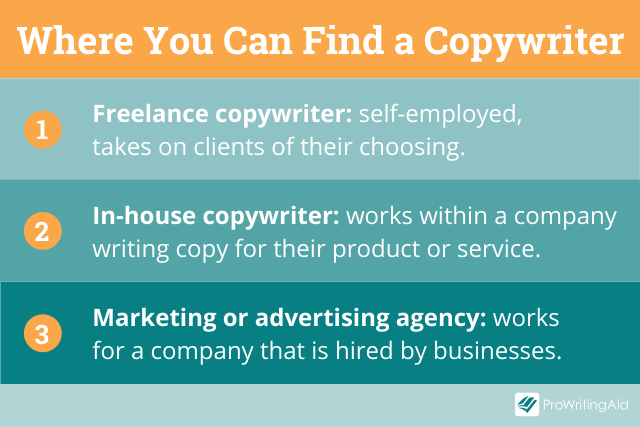
The good news is: everyone with a business needs copywriting. Even the most business-savvy CEOs might not have the word-crafting skills to write successful copy that converts.
As more people start companies or increase their online presence, digital marketing copywriters will be in even higher demand.
Where Can I Work as a Copywriter?
There are three main types of places where copywriters work. The first is within a company. Many companies have an in-house copywriter or even a whole team of them! You’ll work closely with the rest of the marketing department.
You can also find work with a digital marketing agency or advertising firm. Businesses hire these companies to write copy for them.
Finally, there’s the freelance writer route. A freelance copywriter sets their own rates, works on projects they’re interested in, and gets paid directly by their clients.
Not all freelance writers are copywriters, and not all copywriters choose the freelance writing business route.
Each path has its pros and cons. It’s up to you to decide whether you see yourself as a freelance writer or an employee.
Do I Need a Degree to Be a Copywriter?
A degree can make finding entry level copywriting jobs easier, but it isn’t required for a successful career.
Many marketing agencies or businesses require a Bachelor’s degree in a field like English, marketing, or advertising for their beginner copywriters.
Experience is king, however. A degree isn’t necessary for freelance copywriters. Once you have gained relevant, recent experience, companies are more likely to take a chance on you.
To get a copywriting job without a degree, the company will want to know if you can write quality copy that converts. Any statistics on conversions from a client will help you in job applications and interviews.
What Are the Different Copywriting Jobs?
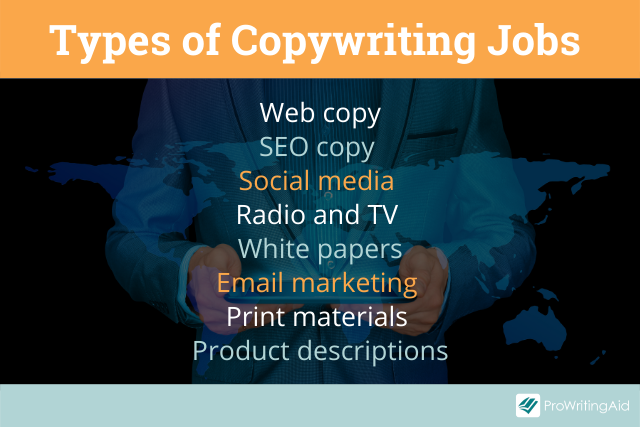
Copywriting encompasses many types of writing. Some focus on online marketing, while others involve other media. Some copy is short form, while other types are longer form.
We’re covering eight of the major kinds of copywriting. Depending on the copywriting job, you might write only one kind or several.
Product Descriptions
When you think of writing copy that sells, product descriptions might be the first things that pop into your mind.
Writing descriptions for products and services, whether online or in print, is important for any business.
Product copywriters must know the difference between persuading customers and listing specs. Product copy should be catchy, solve a problem for the customer, and use descriptive language.
There’s a big difference between sales copy and a product guide or an FAQ page. Succinct, creative storytelling that offers a solution is the key to good product copy.
Web Copy
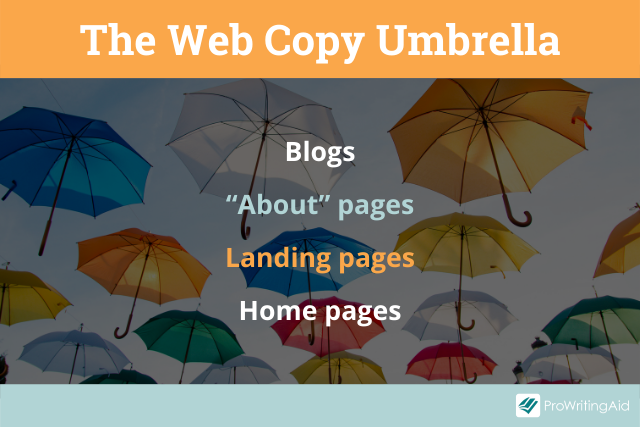
Web copy is a big umbrella. For this article, we are including marketing-oriented blog posts, as well as landing pages and other website copy in this category.
Keep in mind that every type of web copy has slightly different requirements, although the goal is the same: converting readers into customers.
A web copywriting job might have you optimizing the language on every page of a business’s website to target keywords and convert readers.
Many businesses use blogs to talk about their product or service. This is a longer form of web copy that requires mastering a conversational tone.
No one wants to read an 800+ word sales pitch! It’s like reading a late-night infomercial.
Freelance copywriters often specialize in a specific type of web copy or offer both under their services. Not all blogging is copywriting, either. Some freelance writers focus on informational blogging instead.
Email Marketing
You know all those emails that you sign up for when you’re interested in a brand? There’s a copywriter behind those.
Email marketing is a crucial part of the sales funnel. The reader is already interested. It’s up to the person writing the email copy to convert them to a paying customer.
Email marketing copywriting jobs are always in demand. Many self-employed people hate writing their own email campaigns and will gladly outsource it to an expert.
Print Materials
While online copywriter jobs are growing rapidly, there is still plenty of demand for copywriters who specialize in print materials.
This could be magazine or newspaper ads, brochures, flyers, or anything else that customers get their hands on—literally!
Print copy can also include ads on billboards, buses, and other places. If you prefer to write catchy copy anywhere that isn’t online, specializing in print materials might be the niche for you.
SEO Copy
Search engine optimization, or SEO, is the process of getting a webpage to show up closer to the top of the search engine results for a keyword. Writing to target specific key terms is an important part of SEO.

Becoming knowledgeable in SEO writing makes you an extremely marketable copywriter. You can help businesses become more visible on Google.
Basic SEO knowledge should be part of any online writer’s arsenal of writing tools, but expert SEO copywriters are a hot commodity.
Social Media
Social media marketing is an important part of any business’s marketing plan in today’s world. Social media gives businesses free platforms to promote themselves. Who wouldn’t want to take advantage of that?
Copywriting jobs for social media posts are always in high demand. Social media copywriters often have to work within low character counts. They need to build a connection and sound more personal than sales-oriented.
Often, the goals of social media copy include gaining new followers, increasing reach and visibility, and getting newsletter sign-ups, rather than directly selling a product or service.
Copywriting jobs for social media often include other tasks like managing a content calendar, researching hashtags and trends, finding the ideal times for posting, and responding to comments. This all falls under social media management.
Not all social media copywriting jobs require these skills, but it can be a fun field to specialize in.
Radio and TV
Don’t think that radio and television marketing is going out of style. There are always ads on streaming services, and these require copywriters.
Copywriting jobs for radio, TV, and other similar media require a writer to be conversational. You must meld scriptwriting with persuasive writing. These copywriter jobs might be harder to come by, but they can also be a lot of fun.
White Papers
Writing white papers can be one of the most lucrative freelance writing jobs out there. It requires a balance of informative, data-driven writing and persuasive, engaging copywriting.
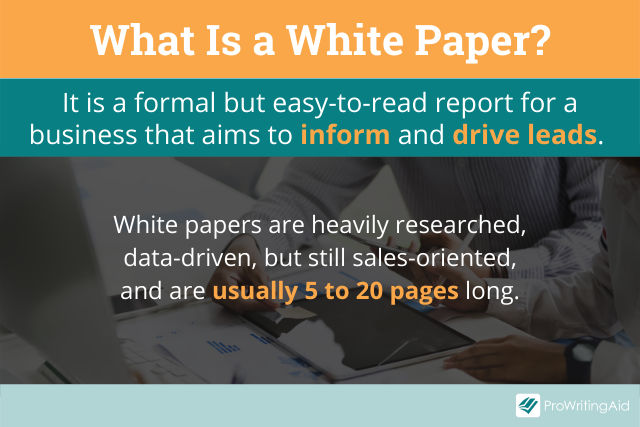
What’s a white paper? It’s a long-form report, usually somewhere between five and twenty pages, that provides information about a company to drive leads.
White papers are well-researched and based heavily on data. However, they don’t read like a technical report.
They should be formal, but easy to read. White pages need to provide ample information while also persuading potential clients to invest in a product or company.
A freelance copywriter can make upwards of $2,000 for one white paper.
5 Skills Needed for Copywriting Jobs
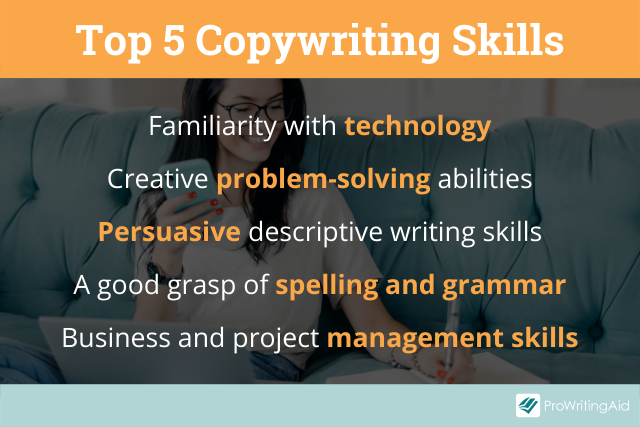
There are many skills a beginner copywriter should have, many of which you can learn along the way. However, if you’re looking for entry level copywriting jobs, there are some things you should already have in your writing arsenal.
Here are our top five skills that every copywriter needs.
A Good Grasp of Spelling and Grammar
Spelling and grammar errors are the quickest way to make potential clients lose faith in a product or service. You don’t need to recite The Elements of Style, but you should have a solid grasp of spelling and grammar rules.
No matter how great you are at spelling and grammar, you should also have a reliable grammar checker for all the copy you write. Even experts make mistakes.
You should also make sure your job applications, pitches, and cover letters are free from grammatical errors. Think of these as a sample of your copywriting, but the product you’re selling is you!
Persuasive, Descriptive Writing Skills
Persuasive writing is the backbone of copywriting. Written copy should tell a story and evoke a feeling in your audience. Copy should explain how something solves a problem for the reader.
Copywriting jobs differ from technical writing or creative writing. You must be able to persuade readers to take the next step with a clear call-to-action. At the same time, you don’t want to use overly gimmicky, “salesy” language.
Pay attention to the products and services you buy or the company newsletters you subscribe to. What about the language pulls you in?
If you need help with improving your copywriting skills, ProWritingAid can help. Change the document type to general web copy, marketing text, or sales email and receive custom suggestions that make sense for your work’s context.
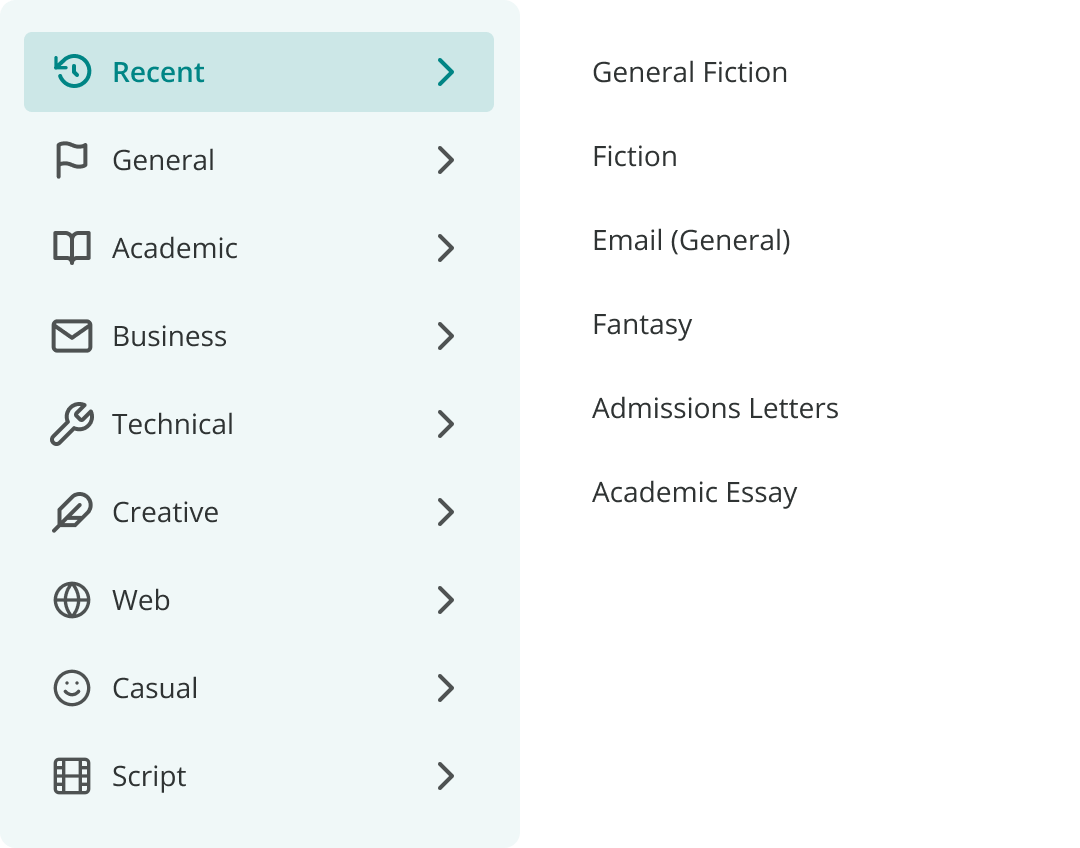
Our editing tool also checks for hidden verbs and vague words to make sure every sentence in your copy packs a punch.
Familiarity with Technology
Copywriting is often a remote job. Even if you work in an office at a marketing firm, you will likely be communicating with clients remotely.
While you don’t need to be a software developer, you should be comfortable and familiar with technology. You will often communicate with clients over a video platform like Zoom or a chat platform like Slack.
Many companies use various project management tools. Sometimes, you will need to write your copy directly into the backend of a blog or website.
Email and social media copywriting jobs will require a working knowledge of social media schedulers and email marketing tools.
You don’t need to be an expert on everything, but you should be familiar enough with technology to quickly learn a new program depending on your project or client.
Business and Project Management Skills

Business skills are particularly important if you have a freelance writing business.
You’ll need to keep track of taxes, expenses, invoicing, contracts, and more. A freelance copywriter is their own boss. You’re self-employed, and you will need to treat your copywriting jobs like a business.
Whether you choose in-house copywriting or freelance writing, you should have some project management skills.
Copywriting jobs involve many moving parts, with multiple due dates, edits, client check-ins, brainstorming meetings, and more. Often, you’ll be working on more than one project at a time.
Find a calendar or planner system that works for you, and check out productivity and project management apps.
Creative Problem-Solving Abilities
A copywriter solves problems all day. Not only do you need to show customers a solution to a problem in their copy, you need to solve problems for clients.
Email click rates are low. No one is buying a product that you just updated the copy for. People are bouncing from a web page within a few seconds.
While the issue might not always be the copy, it’s up to you to figure out how writing good copy can solve problems for your clients.
10 Steps to Get Copywriting Jobs
Now that you know what it takes to become a copywriter, you need to know how to actually get copywriting jobs.
We’re not just going to set you loose on the job boards. Check out our ten steps you should take to find the copywriting job of your dreams.
Step 1: Learn About the Industry

Once you decide that you’re ready to be a copywriter, it’s time to learn everything you can about the industry.
You can take an online course about copywriting or freelance writing. Many of the great freelance writing courses cover copywriting in-depth.
There are some classes that are major investments, like The Copy Cure or Creative Circus. You can also find more affordable options on sites like Udemy and Skillshare.
There are also plenty of great books on copywriting. One of the best books out there is The Boron Letters by Gary Halpert.
If you can’t invest in a copywriting course, that’s okay. Read books and blogs, listen to podcasts, and watch free videos on YouTube. Don’t stop learning about copywriting once you land a job.
Good writers are always learning and improving.
Step 2: Reach Out to Friends and Family
When you’re first getting started with copywriting, it can be hard to find a job. How do you get the experience everyone requires for paid writing work?
Chances are you know several small business owners among your friends and family. Reach out to people you know and ask if you can offer them some copywriting work for free or a very discounted rate.
Many experts will tell you to take on free jobs at first. Free doesn’t pay the bills, and not everyone is in a position to do this.
If you can, great! Offering your copywriting services for free is an excellent way to gain experience.
If not, negotiate a rate that will put a little money in your pocket but save them the cost of hiring an experienced writer.
You can also consider swapping services. Do you know a graphic designer? Offer to spruce up their web copy in exchange for a logo or some web design. Friends with a private chef? Write copy in exchange for a few meals.
Get creative! As a freelance writer, you are a small business, and small businesses love to support each other.
Spread the word that you’re breaking into the field of copywriting. Post on social media, tell your mom to tell her ladies’ poker night, put a notice in your church bulletin.
Friends and family can also recommend you to people they know for more entry level work.
Step 3: Build a Portfolio
Once you’ve started to find some gigs, you have the beginnings of a portfolio.
Building a portfolio is crucial. Save everything you’ve written. Be sure to ask your clients if you can use your work for them as samples.
This is typically only an issue with longer form copy like blogs or white papers that might have hired you as a ghostwriter.

Don’t rely on your clients’ websites to hold work you’ve done. Websites go down, companies go out of business, and web copy gets changed.
Save your original work in a document. There are also extensions and apps that will allow you to save a web page as a PDF.
The best place to keep your portfolio is directly on your website. Pick some of your best samples and let potential clients know you have more samples upon request.
If you’re struggling to gather work for your portfolio, and you’ve exhausted your friends and family network, make up some products and write the copy for them.
Don’t forget that your website, emails, and social media presence are also the first examples of copy that your clients see. A killer website for your copywriting business can put you a step above the competition.
Step 4: Master SEO
As we mentioned above, clients are always looking for writers who can improve their search engine rankings. If you can market yourself as knowledgeable about SEO, you are setting yourself apart from other copywriters.
Invest time and, if possible, money in learning whatever you can about search engine optimization.
There’s more to it than just writing with keywords, even though that will be your focus as a copywriter. Because SEO is based on changing algorithms, it’s important to keep up-to-date on the latest ways to improve search rankings.
It’s not hard to learn about! There are courses you can take about SEO, as well as tons of blogs and podcasts dedicated to the subject.
Potential clients may also want proof that you know what you’re doing. Periodically reach out to past or ongoing clients and ask for stats on their SEO or conversions.
If you have numbers to back up the success of your web copy, you’ll have clients beating down your door to work with you.
Step 5: Pick a Niche or Two
You’ll notice that we didn’t say to pick a niche right off the bat like some freelance writing resources do.
The reason is because it’s much harder to find experience when you’re getting started if you narrow your focus too much. Additionally, you might pick a niche and six months and then decide you hate it!

After you’ve got a nice start to your portfolio, you can get pickier about the jobs you take. You might have even discovered a niche from a job that you never thought would interest you!
Now you’ve got a sample within that field to help you find better jobs.
You can take a few different approaches to choosing a niche. You can choose to specialize in a style or two.
If you really love short form, direct response copywriting, maybe product descriptions are what you love. Are you a data-driven writer? Specialize in white papers.
You can also choose an industry. Perhaps you are passionate about style and fashion. You can offer multiple types of copywriting in that industry, such as product descriptions, email marketing, blogging, and website copy.
You could also choose a style and an industry. In general, the more specialized your niche, the higher your potential earnings. But it also makes freelance jobs harder to find, so there’s a trade-off.
Do you write for the wellness industry? Great. Are you an expert at white papers? Awesome. But if you specialize in white papers for the wellness industry, you can make even more money.
This is why it takes time to find a successful niche. Once you do, you can position yourself as an expert, and charge what an expert is worth. Do you have two specialized niches that you love? You’re well on your way to earning top dollar!
Don’t feel like you’re permanently attached to the niches you choose. Copywriting experience is still relevant if you decide to pivot.
The great thing about a copywriting career is there is always something new to try if you’re getting burned out.
Step 6: Build Your Brand
If you choose to be a freelance writer, you’ll need to build your brand identity. A freelancer is a one-person small business. You should market yourself as such.

Building your brand allows clients to know exactly who you are, what you specialize in, and what they can expect from working with you.
Once you’ve decided on niches to specialize in, you can really develop your brand even better. Who are you as a copywriter? Is your tone more formal and authoritative, or conversational and approachable?
An important first step in building your brand is having an up-to-date website.
Your website is a glimpse of you. It lets your potential clients see your face and have a feel for the type of person they’ll be working with. Every website should have a contact form and an about page.
Beyond that, it’s a great idea to house your portfolio on your website. You can also further establish yourself as an expert in your niche if you blog about it or offer some other content that shows you are passionate about your career.
Your brand should be consistent across your official social media platforms, too. LinkedIn is a great platform to highlight your portfolio, share content, and connect with other freelancers and potential clients.
Whichever platforms you choose to represent your freelance copywriting business should match the tone you use on your website.
Building a brand doesn’t have to cost a lot of money. It’s easy to build your own website, and paying for self-hosting has become more affordable.
While a professional web designer is always nice, there are countless templates you can use to design your own website.
Beyond your website, you can use tools like Canva or Adobe Spark to create brand kits, graphics for social media posts, and even logos.
Your brand identity should extend to your email, as well. Most web hosting sites offer affordable email options, so you can look extra professional with an email handle at “yourname.com.”
Whether you choose that route or a basic email address, you should craft a professional email signature.
Remember, however you communicate with potential clients is a representation of your brand.
Step 7: Join Job Boards
You know what it takes to become a copywriter, but where do you actually find copywriting jobs?
Job boards are a great way to find amazing copywriting gigs. Sometimes those gigs are one-off projects, but a short project can turn into ongoing work. You can even find full-time in-house copywriter job postings!
There are always the main job boards like Indeed or Monster.
You can also join boards that specialize in freelance jobs. Sites like Flexjobs are geared toward freelance and remote work positions.
Upwork is another reliable place to find copywriting jobs.
A job board just for paid writing work, such as Problogger or Freelance Writers Den, is also a great option.
Step 8: Network, Network, Network
Just like any other industry, networking is everything for a copywriter.
Connecting with other copywriters helps to build your support system. They can also pass on jobs to you that aren’t the right fit for them. You should also network with people in industries you’re interested in.
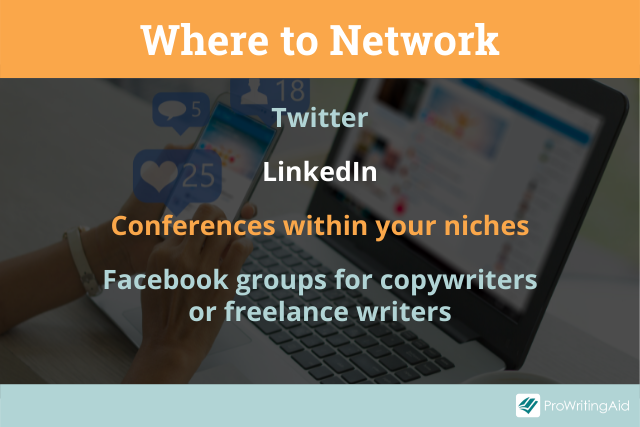
Social media makes networking so much easier than relying on going to conferences or waiting for a mutual acquaintance to introduce you to a lead.
LinkedIn allows you to network with people in all types of industries and positions. Facebook groups for freelance writers often have job postings. Even Twitter can be a powerful place to connect.
Remember, networking isn’t about getting a quick job. It’s about building relationships.
You must nurture network relationships. Send other writers gigs they might be interested in. Interact with their content online. Share resources about copywriting or the niche you specialize in.
Step 9: Craft Amazing Applications
Once you’ve found a job posting to apply for, it’s time to write that cover letter and fill out the application. There are a few steps you should take to craft amazing job applications.
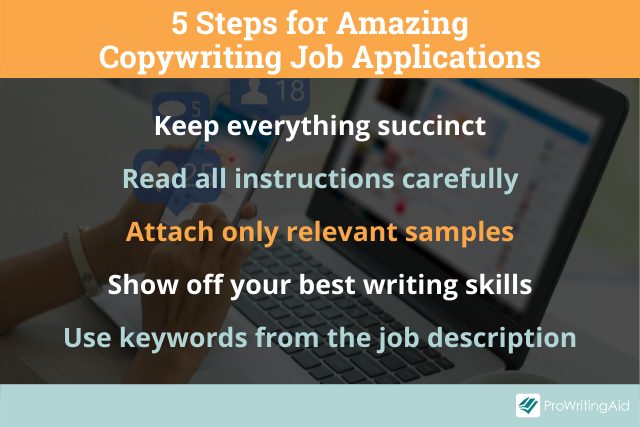
First, read all instructions carefully. If you can’t follow the specific instructions, such as how many samples to send or what to put in the subject line, potential clients won’t be impressed.
Second, attach only relevant samples. This might be harder at the beginning of your career, but try your best. If you’re applying to write blog copy, they won’t be interested in product description sales copy.
Show off your best writing skills. You are selling your ability to write. Use a grammar checker. Run a style check. And proofread several times!
Use keywords from the job post to show that you’re a perfect fit and to get your application past any job board algorithms the company may use.
Finally, make sure your resume and cover letter are succinct and easy to read. Hiring managers look at dozens of applications a day. They should be able to scan your documents to decide if they want more information from you.
Step 10: Be Consistent and Reliable
Whether you’re a freelance writer or a full-time employee, you should be consistent and reliable.
Communicate clearly, politely, and in a timely manner with your clients. Consistently provide quality work. Meet deadlines, and when you can’t, tell your client.
Update your portfolio regularly. You will grow and improve as a copywriter the more work you do. Keeping an updated portfolio shows clients the quality and skill they can expect from you.
The copywriting community is a small world, and social media makes it smaller. Keep your reputation as a professional copywriter impeccable so you can find your dream job.
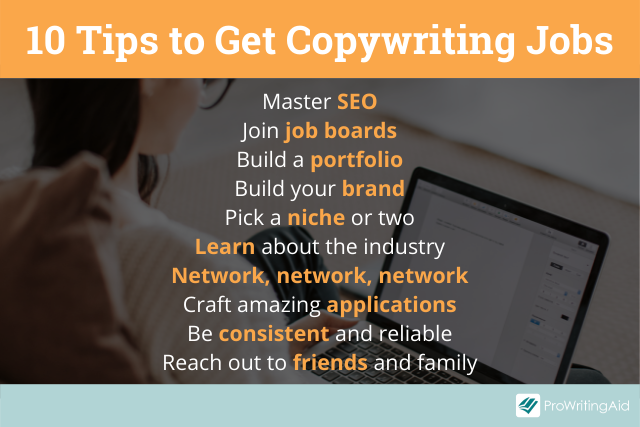
Is Copywriting Right for You?
Copywriting isn’t a get-rich-quick job, but it can be a fun and lucrative career or side hustle. It’s a great field if you crave dynamic, creative work.
Successful copywriters are passionate and knowledgeable about writing.
They love to tell stories and solve problems. They’re driven and not afraid to put themselves out there. A good copywriter is always learning and striving to improve their skills.
If these traits sound like you, then copywriting might be your perfect career.


